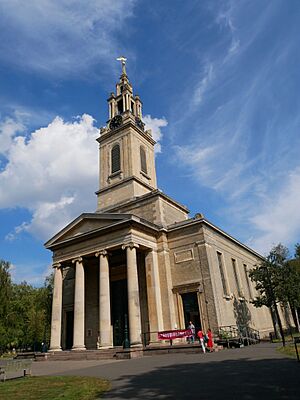St James's Church, Bermondsey facts for kids
Quick facts for kids St James's Church, Bermondsey |
|
|---|---|
 |
|
| 51°29′49″N 0°04′00″W / 51.4970°N 0.0668°W | |
| Location | Bermondsey, London |
| Country | England |
| Denomination | Church of England |
| History | |
| Status | Active |
| Consecrated | 7 May 1829 |
| Architecture | |
| Heritage designation | II* |
| Designated | 6 December 1949 |
| Architect(s) | James Savage |
| Style | Neo-classical |
| Years built | 1827–1829 |
| Administration | |
| Parish | St James', Bermondsey |
| Archdeaconry | Southwark |
| Episcopal area | Woolwich |
| Archdiocese | Canterbury |
| Diocese | Southwark |
| Province | Canterbury |
St James's Church, Bermondsey, is a historic Church of England church. It is located in Bermondsey, a part of south London. This beautiful church was designed by a famous architect named James Savage.
The church was built as part of a special plan. This plan was set up by the Church Building Acts. These acts helped build many new churches across England. St James's Church was finished and officially opened in 1829.
In 1840, it became its own separate parish. This means it had its own local church area. Before that, it was part of the older parish of St Mary Magdalene's, Bermondsey. In 1949, the church was given a special status. It was named a Grade II* listed building. This means it is a very important historical building.
Building the Church
The church's tall spire is very special. Its design was inspired by another famous church. That church was St. Stephen Walbrook, designed by Sir Christopher Wren. To build the spire, the church needed more money. A special law was passed in 1831 to borrow these extra funds.
The Churchyard
The area around the church is called the churchyard. For many years, people were buried there. However, in 1855, the churchyard was closed for burials. After that, people used it for drying clothes.
Later, the Metropolitan Public Gardens Association helped change the churchyard. They turned it into lovely gardens for everyone to enjoy. These gardens opened to the public in 1886. Some old memorials were kept. These included an obelisk (a tall, thin monument) and some chest-tombs.
See also
- Grade I and II* listed buildings in the London Borough of Southwark

